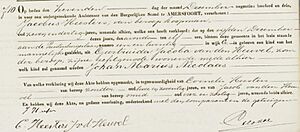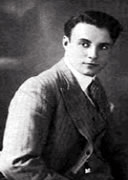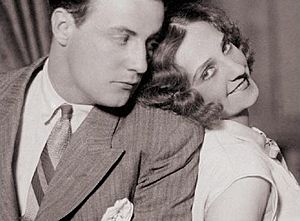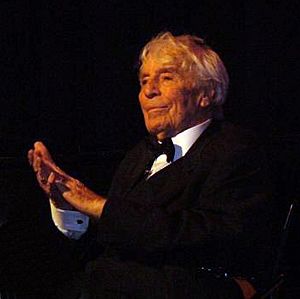Johannes Heesters facts for kids
Quick facts for kids
Johannes Heesters
|
|
|---|---|
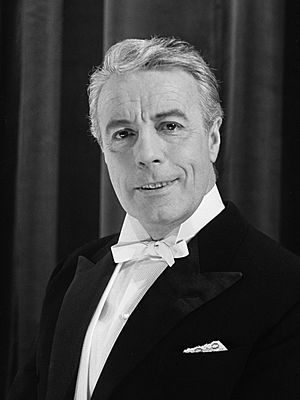
Heesters in 1964
|
|
| Born | 5 December 1903 Amersfoort, Netherlands
|
| Died | 24 December 2011 (aged 108) Starnberg, Germany
|
| Resting place | Nordfriedhof, Munich, Germany |
| Occupation |
|
| Years active | 1921–2011 |
| Spouse(s) |
Louisa Ghijs
(m. 1930; died 1985) |
| Children |
|
Johannes Heesters (born Johan Marius Nicolaas Heesters; December 5, 1903 – December 24, 2011) was a famous Dutch actor and singer. He worked on stage, in movies, and on TV for a very long time, starting in the 1920s. Heesters was one of the oldest performers ever, still acting shortly before he passed away at 108 years old.
From the mid-1930s, Heesters mostly worked in German-speaking countries. He became a big movie star in Nazi Germany. This later caused some arguments and made him a controversial person in his home country, the Netherlands. Despite this, he remained very popular in Germany for many decades until his death.
Contents
Early Life and Career Beginnings
Johannes Heesters was born in Amersfoort, Netherlands. He was the youngest of four brothers. His father, Jacobus Heesters, was a salesman, and his mother, Geertruida Jacoba van den Heuvel, was a homemaker.
Heesters learned to speak German very well from a young age. He lived for several years with a German relative from Bavaria. When he was 16, Heesters decided he wanted to be an actor and a singer. He started taking singing lessons. Early in his career, he focused on operetta, which is a type of light opera. His first big performance in Vienna was in 1934, in a show called Der Bettelstudent (The Beggar Student).
Life During Nazi Germany
In 1935, when he was 31, Heesters moved to Germany permanently with his wife and daughters. His most famous role was Count Danilo in the operetta The Merry Widow. His song from that show, "Da geh' ich ins Maxim", became very well known.
During his time in Germany, Heesters performed for Adolf Hitler. He also visited the Dachau concentration camp. These actions made him a controversial figure for many people in the Netherlands. Joseph Goebbels, a powerful Nazi official, put Heesters on a special list of artists. This list included artists considered very important to Nazi culture. Heesters was the only non-German on this list.
Heesters also gave money to support the German war effort. This added to the controversy around him later on. He always said these accusations were not true, even though some evidence suggested otherwise. He also became friends with some high-ranking Nazi and SS officers. Hitler himself was known to really admire Heesters' acting.
Interestingly, Heesters was also admired by a youth group called the Swingboys. They liked his pale face and slick black hair, and tried to dress like him. His style was very different from what the Hitlerjugend (Hitler Youth) promoted.
Heesters met Hitler several times, especially when playing Count Danilo. Throughout World War II, Heesters kept performing for German soldiers in camps and barracks. Some people, like German author Volker Kühn, claimed Heesters performed for the SS at the Dachau concentration camp in 1941. This claim came from a former Dachau prisoner. However, another writer, Jürgen Trimborn, said this memory might not be completely accurate because it was recalled 50 years later.
In 2009, Heesters lost a lawsuit against Kühn. Heesters admitted visiting the camp but denied performing there for the SS. The court did not decide if Kühn's claims were true. Instead, it ruled that too much time had passed to know for sure.
Career After the War
Heesters continued to work for a major German film studio, UFA, until almost the end of World War II. He easily continued his career in Germany and Austria after the war. He appeared in several more films, like Die Jungfrau auf dem Dach and the 1957 version of Viktor und Viktoria. Around 1960, he stopped making movies to focus on stage and TV shows, and on making music records.
In his later years, Heesters spoke kindly of Hitler as a person, but he disagreed with Hitler's political ideas. In the 1990s, he and his wife toured Germany and Austria with a play called Ein gesegnetes Alter (A Blessed Age). This play was also shown on TV in 1996.
On December 5, 2003, Heesters celebrated his 100th birthday. A TV special called Eine Legende wird 100 (A Legend Turns 100) was broadcast. He received the special title "Kammersänger". He continued to perform even at a very old age. In 2005, at 102, he was a soloist in a big concert tour. He celebrated his 103rd and 104th birthdays with concerts. In February 2008, he performed in his home country, the Netherlands, for the first time in 40 years. There were some protests because of his past connections to the Nazis.
On December 13, 2008, when he was 105, Heesters apologized for calling Adolf Hitler a "good chap" on a German TV show. He said he had said something "stupid and horrible" and asked for forgiveness. Some German media suggested he didn't understand the show was meant to be funny.
In his last years, Heesters took on smaller roles. His eyesight was getting worse due to a condition called macular degeneration. He couldn't perform on stage for long periods. He had to memorize his lines because he couldn't read them from a screen. His last stage performance was on October 31, 2011, in Munich. He also appeared in a short film called Ten in 2011.
Personal Life and Family
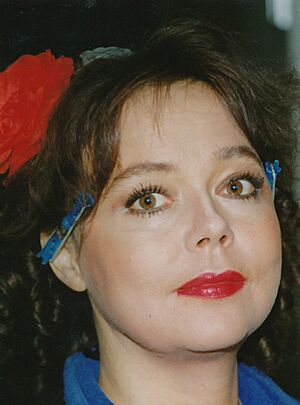
Johannes Heesters had two daughters with his first wife, Louisa Ghijs. They married in 1930. After Louisa passed away in 1985, he married again in 1992. His second wife, Simone Rethel (born 1949), is a German actress, painter, and photographer. His younger daughter, Nicole Heesters, is also a well-known actress in Germany. His granddaughter, Saskia Fischer, is an actress too.
On January 1, 2008, Heesters fell down some stairs at his holiday home and broke two ribs. In December 2010, when he was 107, Heesters announced he had quit smoking for his wife. He said, "She should have me as long as possible."
Heesters gave his last public performance on October 31, 2011. A few weeks later, on November 29, 2011, he got a fever and was taken to the hospital. He received a heart pacemaker and went home just before his 108th birthday. He wasn't strong enough to perform for his birthday or attend the premiere of his last film. He became sick again on December 17 and was readmitted to the hospital. He then had a stroke and passed away on Christmas Eve in 2011. He was survived by his two daughters, five grandchildren, eleven great-grandchildren, and three great-great-grandchildren.
Discography
Albums
- 1965: Jetzt geh' ich ins Maxim
- 2003: Ich werde 100 Jahre alt
Singles
- 1937: "Ich werde jede Nacht von ihnen träumen"
- 1939: "Musik, Musik, Musik" (featuring Marika Rökk)
- 1941: "Liebling, was wird nun aus uns beiden"
- 1941: "Man müßte Klavier spielen können"
- 1949: "Das kommt mir spanisch vor"
- 1949: "Tausendmal möchte' ich dich küssen"
- 1998: "Ich werde 100 Jahre alt"
- 2007: "Generationen" (featuring Claus Eisenmann)
Honours, Decorations, and Awards
- 1984: Bavarian Order of Merit
- 1993: Berlinian Order of Merit
- 2000: Ring of Honour of the City of Vienna
- Bambi in 1967, 1987, 1990, 1997, 2003, 2007, 2008, 2009, 2010, 2011
- 2001: Platinum Romy (TV award)
- 2003: Goldene Kamera
- 2004: Kammersänger
Filmography
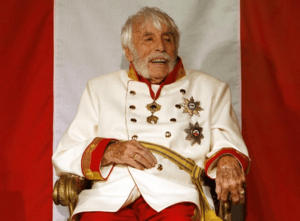
- 1924: Cirque hollandais
- 1934: Bleeke Bet - Ko Monje
- 1935: De Vier Mullers - Otto Muller, hun zoon
- 1935: Everything for the Company
- 1936: The Emperor's Candlesticks - Grossfürst Peter Alexandrowitsch
- 1936: The Beggar Student - Simon Rymanowics
- 1936: The Court Concert - Lt. Walter van Arnegg
- 1936: Die Weltmeisterin
- 1937: When Women Keep Silent - Curt van Doeren
- 1937: Gasparone - Erminio Bondo
- 1938: Nanon - Marquis Charles d'Aubigne
- 1938: Immer wenn ich glücklich bin
- 1939: Das Abenteuer geht weiter - Heinz van Zeelen
- 1939: Hello Janine! - Count Rene
- 1939: My Aunt, Your Aunt - Peter Larisch
- 1940: Liebesschule - Enrico Villanova, Tenor
- 1940: Die lustigen Vagabunden - Werner Schratt, Schauspieler
- 1940: Roses in Tyrol - Graf Herbert von Waldendorf
- 1941: Immer nur Du - Will Hollers
- 1941: Jenny und der Herr im Frack - Peter Holm
- 1941: Illusion - Stefan von Holtenau
- 1943: Karneval der Liebe - Tenor Peter Hansen
- 1943: Melody of a Great City - Spielt sich selbst in einer Revue (cameo)
- 1944: Es lebe die Liebe - Manfred
- 1944: Glück bei Frauen - Stefan Hell
- 1944: Es fing so harmlos an - Clemens Verné
- 1944: Axel an der Himmelstür - Axel
- 1946: Die Fledermaus - Herbert Eisenstein
- 1946: Renee XIV - (unfinished film)
- 1947: Wiener Melodien - Ferry van der Heuvels
- 1948: Insolent and in Love - Dr. Peter Schild, Ingenieur
- 1949: Dear Friend - Adrian van der Steer
- 1950: When a Woman Loves - Martin Pratt
- 1950: Wedding Night In Paradise - Pieter van Goos
- 1951: Professor Nachtfalter - Professor Dr. Joachim Wendler
- 1951: Tanz ins Glück - Pedro Domingo
- 1951: The Csardas Princess - Edwin von Weylersheim
- 1952: The White Horse Inn - Dr. Siedler
- 1953: The Moon Is Blue - Tourist (uncredited)
- 1953: Die Jungfrau auf dem Dach - David Slader
- 1953: A Musical War of Love - Ralph Beyron
- 1953: The Divorcée - Karel
- 1953: Hit Parade - Singer
- 1953: Hab’ ich nur Deine Liebe - Franz von Suppé
- 1955: Hello, My Name is Cox - Paul Cox
- 1955: The Star of Rio - Don Felipe
- 1955: Bel Ami - Georges Duroy genannt Bel Ami
- 1956: Ein Herz und eine Seele / …und wer küßt mich - Johannes Heesters
- 1956: Opera Ball - Georg Dannhauser
- 1956: My Husband's Getting Married Today - Robert Petersen
- 1957: Victor and Victoria - Jean Perrot
- 1957: Von allen geliebt - Rudolf Avenarius
- 1958: Bühne frei für Marika - Michael Norman
- 1958: Frau im besten Mannesalter - Bernhard Hauff
- 1958: Besuch aus heiterem Himmel - John Underhower
- 1959: Die unvollkommene Ehe - Professor Paul Lert
- 1961: Junge Leute brauchen Liebe - Charles Fürst
- 1985: Otto – Der Film - Clochard
- 1994: Silent Love (Short) - Geigensolist
- 2008: 1½ Knights – In Search of the Ravishing Princess Herzelinde - Wissenschaftler
- 2011: Ten (short) - Mr. Peterson (final film role)
Television Appearances
- 1956: Meine Schwester und ich (TV film) - Dr. Roger Fleuriot
- 1960: Am grünen Strand der Spree (TV miniseries) - Graf Chiaroscuro
- 1968: Unsere liebste Freundin (TV film) - Christian Bach-Nielsen
- 1973: Paganini (TV film) - Prince Felice Baciocchi
- 1973: Hallo – Hotel Sacher … Portier!: Opernball (TV series episode) - Marinus de Ryder
- 1974: Hochzeitsnacht im Paradies (TV film) - Dr. Hansen
- 1980: Liebe bleibt nicht ohne Schmerzen (TV film) - Narrator
- 1982: Sonny Boys (TV film) - Al Lewis
- 1984: Beautiful Wilhelmine (TV miniseries) - Marschall Keith
- 1991: Altes Herz wird nochmal jung (TV film)
- 1991-1993: Zwei Münchner in Hamburg (TV series, 33 episodes) - Konsul Thaddäus van Daalen
- 1995: Zwei alte Hasen: Grandhotel (TV series episode) - Jan van Houten
- 1996: Ein gesegnetes Alter (TV film)
- 1999: Theater: Momo (TV film) - Meister Hora
- 2001: Otto – Mein Ostfriesland und mehr
- 2003: In aller Freundschaft: Zurück ins Leben (TV series episode) - Prof. Dr. Junghans
- 2008: Wege zum Glück (TV series episode) - Arbeitgeber Johannes Heesters
See also
 In Spanish: Johannes Heesters para niños
In Spanish: Johannes Heesters para niños


